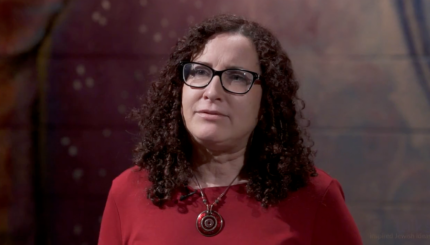Among observant Jews, it’s not uncommon to see God rendered as “G-d,” particularly, though by no means exclusively, in Orthodox communities.
The source of this practice is a passage in Deuteronomy commanding the Israelites to destroy the altars and obliterate the names of non-Israelite gods worshipped by other nations who once lived in the land of Israel. “Do not do so to the Lord your God,” the passage concludes (Deuteronomy 12:4). The commentator Rashi understands this verse to prohibit the erasure of the name of God. This is also why sacred texts containing God’s name, like Torah scrolls and prayer books, are stored in a genizah and/or buried once they have fallen out of use.
The Talmud (Shevuot 35a) elaborates a specific list of God’s names that may not be erased: El, Elohecha, Elohim, Eloheichem, Ehyeh Asher Ehyeh, Ad, Yah, Shadai and Tzevaot. Maimonides offers a slightly different list: the Tetragrammaton (pronounced as Adonai), El, Eloha, Elohim, Elohei, Shadai and Tzevaot.
There is some question about whether this prohibition technically applies to God’s name when written in a language other than Hebrew, with many authorities ruling that it does not. More recently, there has been further debate about whether it should apply when God’s name is written digitally, on a website or in an email. Though there are reasonable grounds for concluding that the prohibition ought not apply in these cases, as in many situations where the law is less than fully clear, some Jews prefer to err on the safe side and avoid the practice anyway. Some also consider it a sign of respect to avoid writing God’s name in any language or medium, or as a means of avoiding the tendency to relegate God to a mere concept that can be captured on paper.
With your help, My Jewish Learning can provide endless opportunities for learning, connection and discovery.
Rabbi Alan Lew, asked during his rabbinical school interview why he wrote G-d instead of God, invoked the latter consideration. He writes:
I didn’t want to speak of God without really thinking of or experiencing God. So I used a hyphen to remind me that that word is not the same thing as God. Well, what happens when you get habituated to G-d? he asked me. Well, then I guess I’ll go to an asterisk, I replied.
Indeed, while G-d is still the most common way God’s name is rendered in print by those mindful of this concern, some have in recent years taken to using G*d or G!d.



